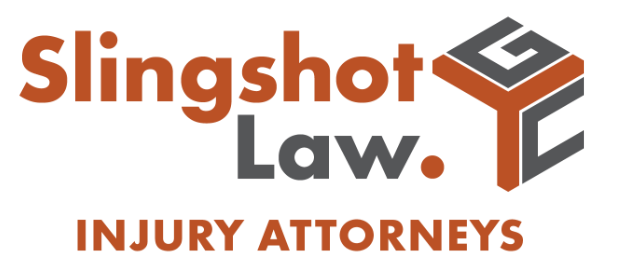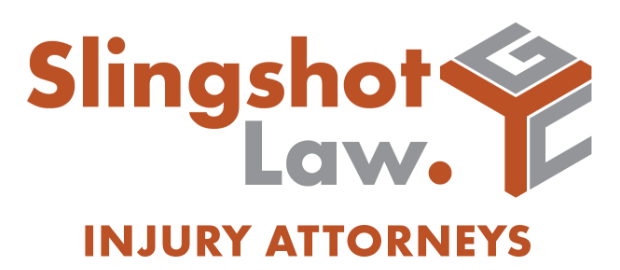Rideshare crashes raise complex insurance questions, determining whether you access a driver’s personal policy limits or $1 million commercial coverage. At Slingshot Law, our Austin rideshare accident lawyer secures trip data, app status records, and driver’s logs to build strong claims for fair compensation.
Passengers injured during rides, pedestrians struck by rideshare vehicles, and drivers hit by Uber or Lyft operators throughout Austin face layered insurance policies that shift based on app status. From I-35 collisions to MoPac rear-end crashes, Downtown Austin intersections to US 183 highway incidents, we preserve evidence establishing app status, driver duty, and coverage tier before companies archive or delete critical records.
We represent rideshare accident victims throughout Travis County, Williamson County, Round Rock, Cedar Park, and Pflugerville. While you focus on medical treatment and recovery, we handle evidence preservation, insurance negotiations, and claims coordination. Call (866) 647-1311 for a free case review.
Key Takeaways for Austin Rideshare Accident Claims
- App status at crash time determines coverage tier—drivers logged off, waiting for requests, en route to pickups, or actively transporting passengers trigger different insurance policies with vastly different limits
- Uber and Lyft provide up to $1 million liability coverage when drivers transport passengers or travel to pickups, but only contingent $50,000/$100,000/$25,000 coverage when waiting for requests
- Trip data from rideshare apps proves driver status, GPS route, and timeline that insurance companies cannot dispute once preserved through legal demand
- Texas proportionate responsibility rules under Civil Practice & Remedies Code § 33.001 reduce recovery by your fault percentage and bar compensation entirely if you’re found more than 50 percent responsible
- Slingshot Law works on contingency, so you pay nothing unless we recover compensation
Why Austin Rideshare Accident Victims Choose Slingshot Law
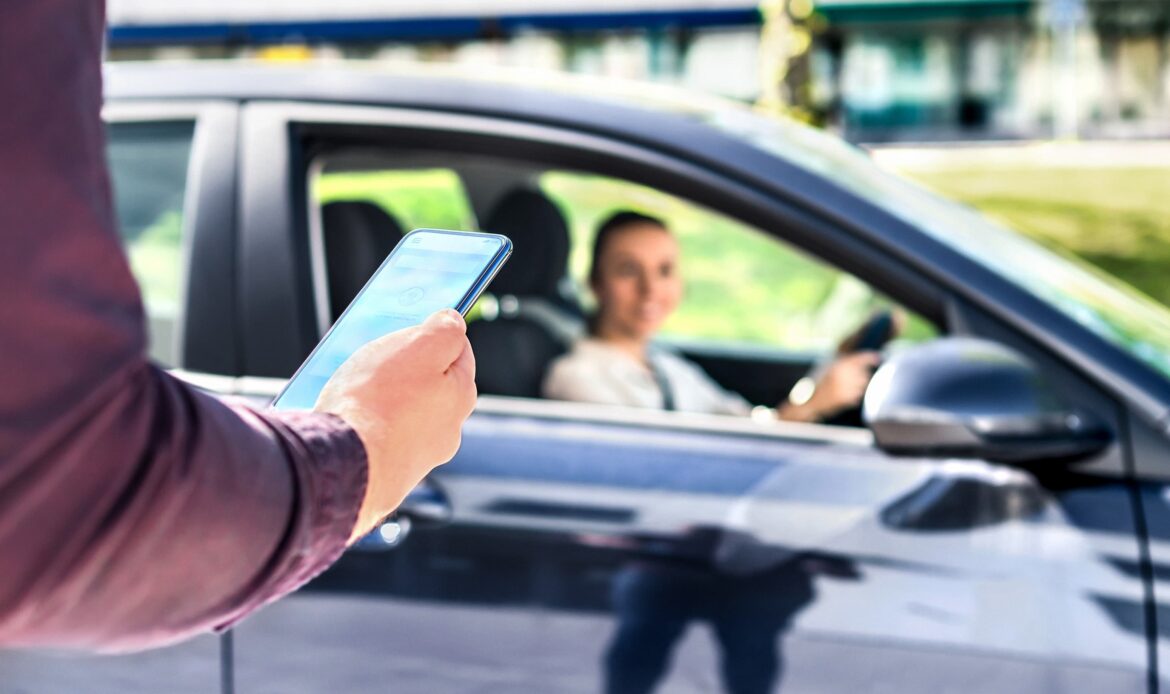
Rideshare accident cases demand immediate evidence preservation and knowledge of transportation network company (TNC) insurance structures, separating adequate representation from results addressing medical costs and lost income.
Our Austin rideshare accident legal services include:
- Immediate trip data preservation through legal demands to Uber and Lyft, securing GPS routes, timestamps, app status records, and driver communications before companies archive or delete data.
- Multi-party liability investigation identifying all potentially responsible parties, including rideshare drivers, other motorists, vehicle owners, and rideshare companies themselves. Crashes caused by drunk drivers, distracted motorists, or vehicles with mechanical defects create additional defendants and coverage sources.
- App status documentation proving whether drivers were logged off (personal insurance applies), waiting for requests (contingent coverage), en route to pickups ($1 million policy), or transporting passengers ($1 million policy) at impact time.
- Crash scene investigation photographing vehicle damage, road conditions, traffic controls, and physical evidence before tow companies remove vehicles or weather alters scenes. We document skid marks, debris fields, and impact dynamics proving fault.
- Medical documentation coordination working with treating physicians to document injury mechanisms, link trauma to crash forces, and establish permanency through diagnostic imaging and specialist evaluations.
- Insurance negotiation handling all communications with Uber, Lyft, and third-party insurers who dispute coverage periods, deploy comparative fault defenses, and minimize injury severity.
- Trial preparation, coordinating with accident reconstructionists and medical experts, if needed, to establish fault and injury severity when settlement negotiations stall or offers remain inadequate.
Our lawyers work on a contingency fee, advancing all case costs, including expert witnesses, medical records, and reconstruction analysis, without upfront payment. Contact Slingshot Law now for your free rideshare accident case consultation at (866) 647-1311. You pay nothing unless we recover compensation.
How Does Rideshare Insurance Coverage Work in Austin, TX?
Rideshare insurance operates differently from standard auto policies. Coverage depends on driver app status and activity at crash time. These “periods” determine which insurer pays your claim and available policy limits.
Period 0: App Off
When rideshare drivers log out of Uber or Lyft apps, their personal auto insurance applies. These crashes get treated like a standard car accident, with the driver’s personal liability limits determining available compensation.
Many personal policies exclude coverage for commercial activity, creating disputes about whether drivers were truly off-duty or had recently completed trips without logging off.
Period 1: App On, Waiting for Requests
Drivers logged into apps but not yet matched with passengers operate under contingent liability coverage. Uber and Lyft provide limited coverage during this period, typically $50,000 per person and $100,000 per accident for bodily injury, plus $25,000 for property damage.
This contingent coverage applies only if the driver’s personal auto insurance denies or excludes the claim, which is frequently the case because personal policies often exclude commercial use, including ridesharing.
Period 2: En Route to Pickup
Once drivers accept ride requests and travel toward passenger pickup locations, Uber and Lyft’s commercial policies activate. These policies provide up to $1 million in liability coverage for injuries to passengers, other drivers, pedestrians, and cyclists.
Uninsured/underinsured motorist coverage up to $1 million also applies, protecting passengers when other drivers lack adequate insurance.
Period 3: Passenger On Board
While transporting passengers, the same $1 million commercial policy remains active. This coverage continues until passengers exit vehicles and trips end in the app.
Claims during this period typically access the highest available coverage limits, making app status documentation critical to claim value.
Common Causes of Rideshare Accidents in Austin
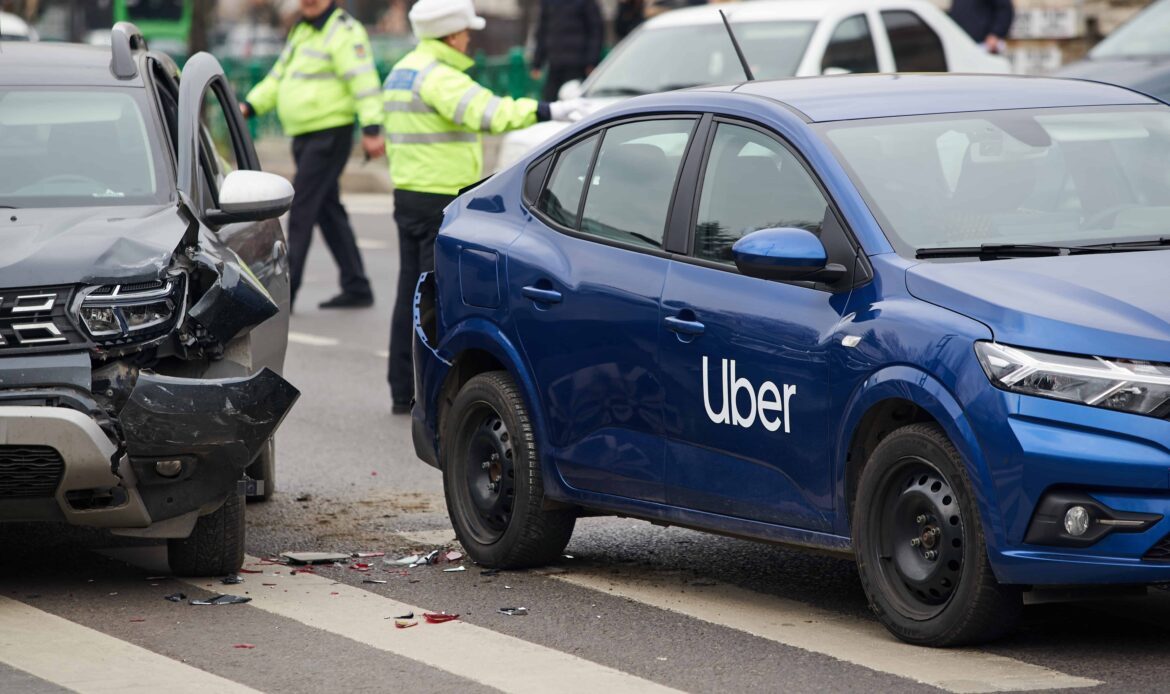
Rideshare drivers face unique pressures contributing to crashes on I-35, MoPac, US 183, and throughout Downtown Austin, the University of Texas campus area, South Congress, and the Domain.
Distracted Driving
Rideshare drivers constantly interact with apps for navigation, ride requests, and passenger communications. Checking phones for new requests, following GPS directions, and messaging through in-app systems diverts attention from traffic. These distractions cause drivers to miss signals, drift across lanes, or rear-end stopped vehicles.
Cell-phone records and app interaction logs establish distraction at crash time.
Driver Fatigue
Many rideshare drivers work extended hours across multiple platforms to maximize earnings. Some drive overnight shifts after working day jobs. Fatigue slows reaction times, impairs judgment, and causes drivers to fall asleep behind the wheel.
Trip logs establish hours behind the wheel before crashes occurred.
Aggressive Driving and Speeding
Rideshare driver earnings depend on completed trips. Pressure to accept more requests and reduce trip times encourages speeding, aggressive lane changes, and rushing through yellow lights. These behaviors increase crash severity and create clear liability.
Inexperienced Drivers
Uber and Lyft allow drivers with minimal experience to transport passengers. New drivers unfamiliar with Austin traffic patterns, highway merging at I-35 and MoPac interchanges, or congested Downtown intersections make poor decisions causing preventable collisions.
Impaired Driving
Despite background checks, some rideshare drivers operate vehicles while impaired by alcohol, drugs, or medications. Police reports documenting field sobriety tests, breathalyzer results, and blood alcohol content establish impairment and create additional liability claims beyond standard negligence.
Building Strong Austin Rideshare Accident Claims
Insurance adjusters challenge app status, dispute coverage periods, and minimize injury severity. Our rideshare accident lawyers address these challenges through comprehensive evidence gathering.
Critical evidence your Slingshot Law Lyft and Uber accident attorney secures includes:
- Rideshare trip data showing GPS routes, timestamps, app status transitions, and driver acceptance/completion records
- Police crash reports documenting fault determinations, violations, and scene observations
- Dash-cam and traffic-camera footage capturing crash mechanics, traffic signals, and driver behavior
- Witness statements collected promptly before memories fade or contact information becomes unavailable
- Cell-phone records proving distraction through call logs, text messages, and app interactions
- Medical records and diagnostic imaging documenting injury extent, treatment courses, and permanency evaluations
- Vehicle damage photographs and repair estimates establishing impact severity and crash forces
- Driver background and safety records revealing prior violations, crashes, or complaints
Comprehensive evidence addresses all adjuster challenges. You must prove the extent of the injury, how the crash occurred, and who is responsible for paying your claim.
Injuries in Austin Rideshare Crashes
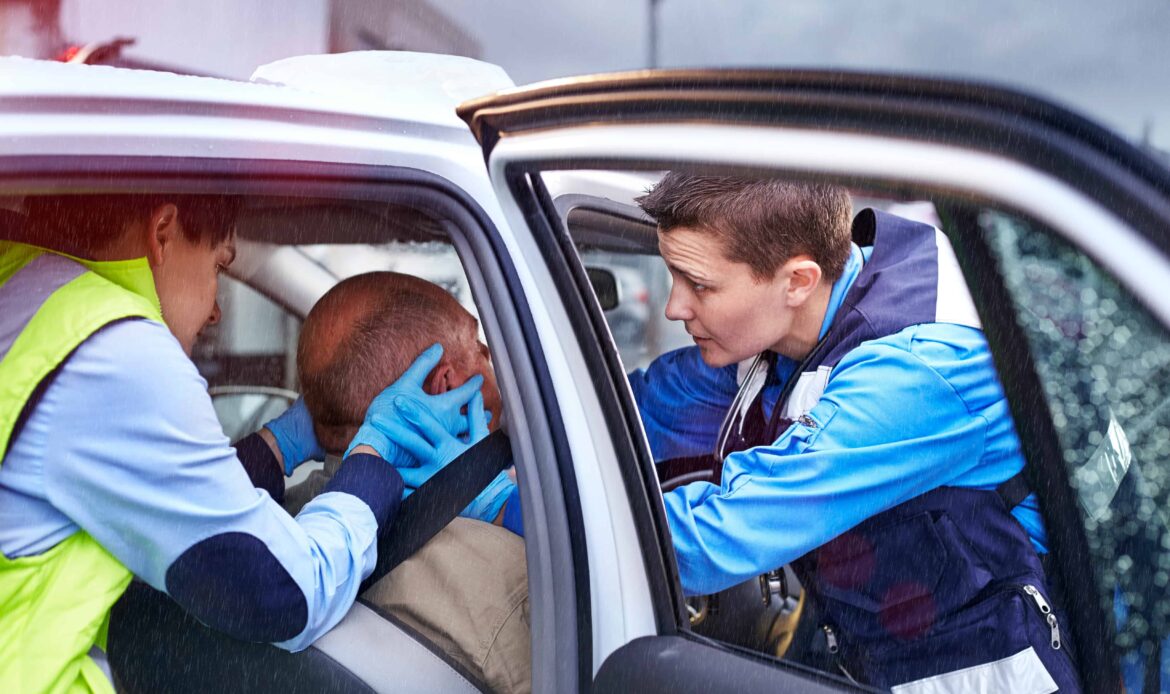
Rideshare crashes cause injuries ranging from soft-tissue strains to catastrophic trauma requiring surgery and long-term rehabilitation.
Common injuries we see after Austin rideshare accidents include:
- Neck and spine injuries, including whiplash and herniated discs, cause headaches, reduced mobility, and chronic pain.
- Fractures and broken bones in arms, legs, ribs, and facial structures result from impact forces. Compound fractures require immediate surgical intervention, extended recovery, and may create permanent limitations.
- Head and brain injuries, including concussions and traumatic brain injuries, cause cognitive deficits, memory problems, personality changes, and chronic headaches.
- Internal injuries to organs require emergency intervention. CT scans document damage demanding immediate surgical treatment and extended hospital stays.
- Lacerations and soft-tissue damage from broken glass cause cuts requiring stitches, visible scarring, and potential nerve damage affecting hand function and sensation.
Rear seat passengers, passengers without seatbelts, pedestrians, and bicyclists are at greater risk of suffering serious injuries.
Compensation in Austin Rideshare Accident Cases
Texas law permits recovery for both economic and non-economic losses in rideshare accident claims.
Economic damages compensate measurable financial losses, including:
- Medical expenses covering emergency care, hospitalization, surgery, physical therapy, specialist consultations, and ongoing treatment
- Future medical costs for permanent injuries requiring continued care, assistive devices, or home modifications
- Lost wages from missed work during recovery documented through employer statements and tax records
- Diminished earning capacity when injuries prevent returning to prior employment or require career changes
- Property damage for vehicle repair or replacement
- Rental car expenses during repairs
Non-economic damages address intangible harm, including:
- Pain and suffering from physical injuries, chronic pain, and reduced quality of life
- Mental anguish, including anxiety, depression, and PTSD
- Physical impairment limiting mobility and daily activities
- Disfigurement from visible scarring
- Loss of enjoyment of life when injuries eliminate hobbies and recreational activities
Claim value varies based on injury severity, medical expenses, lost wages, permanency of impairment, clarity of fault, and available insurance coverage through rideshare companies and other parties.
Determining Liability in Austin Rideshare Crashes
Multiple parties may bear liability in Uber and Lyft accidents, creating complex insurance negotiations.
Rideshare Driver Negligence
Drivers who cause crashes through distraction, fatigue, speeding, or impairment face personal liability. Their insurance, whether personal or commercial, depending on app status, provides coverage.
Other Driver Fault
When third-party drivers cause crashes involving rideshare vehicles, their liability insurance pays damages. The rideshare’s uninsured/underinsured motorist coverage may provide additional compensation when other drivers lack adequate insurance.
Rideshare Company Liability
While Uber, Lyft, and other rideshare companies may structure operations to limit direct liability, their insurance policies cover driver negligence during covered periods. Many claims pursue these commercial policies rather than suing companies directly.
Vehicle Owner Liability
Rideshare drivers sometimes operate vehicles they don’t own. Vehicle owners may face liability when they allow uninsured or incompetent drivers to operate their cars. Our Slingshot Law team investigates ownership and pursues available policies.
Steps to Take After an Austin Uber or Lyft Accident
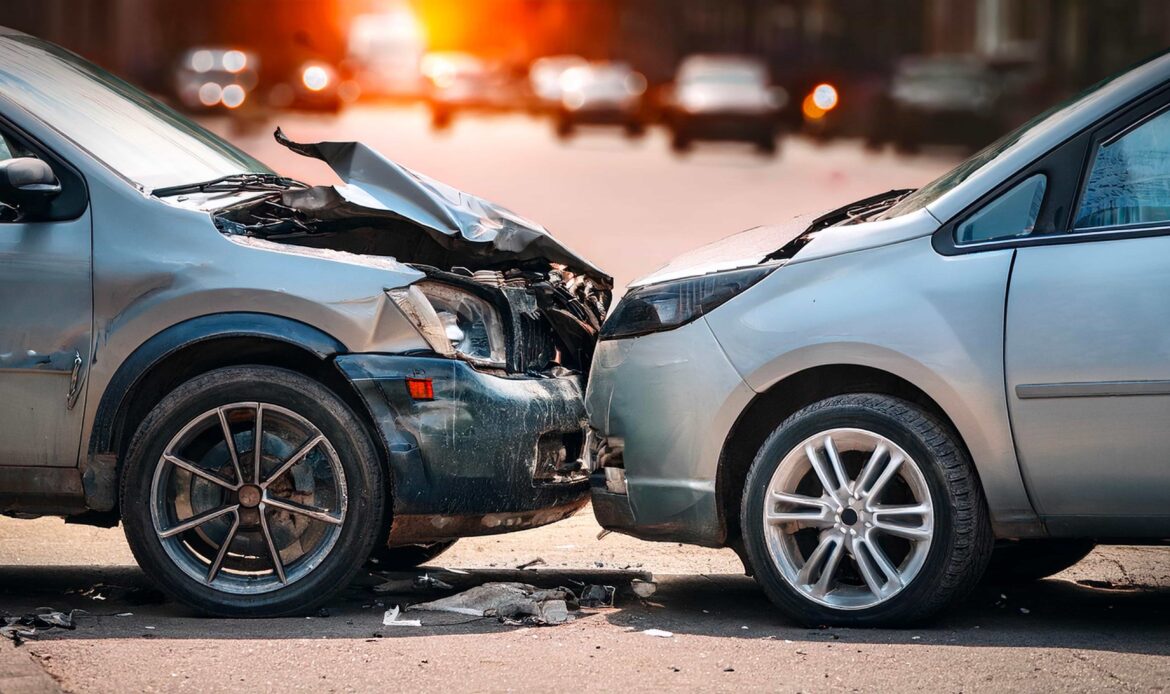
Actions taken after rideshare crashes shape claim outcomes and settlement prospects.
Get Medical Treatment
If you haven’t, seek immediate medical evaluation. Internal injuries, concussions, and spinal damage may not produce immediate symptoms. Emergency departments provide CT imaging and examination, documenting injuries before symptoms worsen or insurers claim pre-existing conditions.
Report to Rideshare Company
Report the crash through the rideshare app. Uber and Lyft require in-app incident reports. This creates official records and triggers insurance claim processes. Complete this as soon as possible, even from the hospital.
Get a Police Report
Obtain the police report. Austin Police Department crash reports are available at APD headquarters at 715 E 8th Street or through online systems. Texas Department of Public Safety handles highway crashes. Request copies for your records.
Photograph Damages
If you can, photograph the scene and vehicles. Take pictures of vehicle damage, road conditions, traffic controls, visible injuries, and any physical evidence, when you are able.
Preserve Documentation
Preserve all receipts and records. Save medical bills, pharmacy receipts, therapy invoices, and wage-loss statements from employers. Photograph visible injuries and their progression during recovery.
Do Not Give Recorded Statements
Do not give recorded statements to adjusters. Texas law does not require cooperation with insurers before litigation. Adjusters use recorded statements to obtain admissions or lock you into accounts before understanding injury severity. Politely decline and refer them to your attorney.
Contact Slingshot Law’s Rideshare Crash Attorney
Contact an Austin rideshare accident lawyer immediately. Slingshot Law preserves trip data, secures app records, and coordinates medical documentation while you focus on recovery.
FAQ for Austin Rideshare Accident Cases
Can I Make a Claim if I Was the Rideshare Driver Who Got Hit?
Yes. If another driver caused the crash while you were logged into the app, you may access Uber or Lyft’s uninsured/underinsured motorist coverage up to $1 million (if en route or transporting a passenger) or contingent coverage (if waiting for requests). Your personal auto policy may also provide coverage depending on app status and policy terms.
What if the At-Fault Driver Is Uninsured or Underinsured?
Uber and Lyft provide uninsured/underinsured motorist (UM/UIM) coverage up to $1 million when drivers are en route to pickups or transporting passengers. This coverage pays for your injuries when at-fault drivers lack adequate insurance. Your own UM/UIM policy may also provide additional compensation depending on policy stacking rules.
Who Pays Medical Bills Before Settlement?
Medical providers typically bill health insurance, which pays subject to subrogation rights requiring reimbursement from settlements. Without health insurance, some providers accept liens, agreeing to wait for payment until cases resolve. Rideshare insurers rarely pay medical bills directly before settling claims.
How Long Do I Have to File a Claim in Texas?
The Texas statute of limitations allows two years from the crash date for personal injury claims. Filing promptly preserves evidence, prevents defendants from raising statute defenses, and maintains pressure for fair settlement negotiations.
How Much Does an Austin Rideshare Accident Lawyer Cost?
Slingshot Law rideshare accident lawyers work on contingency, meaning you pay nothing up front. Fees come only from any settlement or verdict. We advance all case costs, including expert witnesses, medical records, and accident reconstruction, without requiring payment, recovering expenses only if we secure compensation.
Contact Slingshot Law’s Austin Rideshare Accident Lawyer
Rideshare accidents create insurance complexities, determining whether you access personal policy limits or $1 million commercial coverage. Trip data, app records, and driver logs disappear or become harder to obtain over time. Early action strengthens every case element.
While you manage medical treatment, insurance companies focus on minimizing what they pay. Our Austin rideshare accident lawyer secures the evidence proving app status, coverage tier, and driver fault that insurers cannot dispute.
Call (866) 647-1311 for a free case review to discuss your Austin Uber or Lyft accident claim. Let our rideshare accident attorneys handle evidence preservation, coverage analysis, and settlement negotiations while you focus on healing and returning to normal routines.
Austin Office
Address: 1802 Lavaca St, Austin, TX 78701
Phone: 866-647-1311
